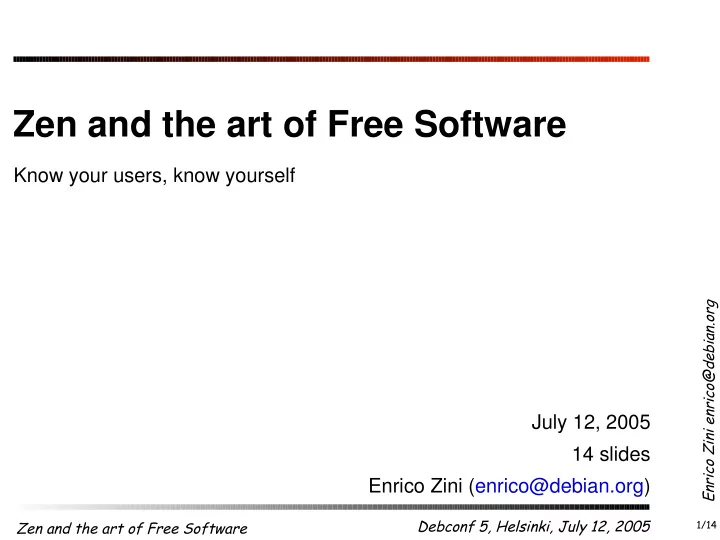

Zen and the art of Free Software Know your users, know yourself Enrico Zini enrico@debian.org July 12, 2005 14 slides Enrico Zini (enrico@debian.org) Debconf 5, Helsinki, July 12, 2005 Zen and the art of Free Software 1/14
What I'll be talking about ● I will introduce 2 key concepts: "situation" and "frustration" ● I will explain how to do: ● Social specifications ● Social design ● Social testing ● Social debugging Enrico Zini enrico@debian.org ...all of this in 45 minutes: get rrrrready! Debconf 5, Helsinki, July 12, 2005 Zen and the art of Free Software 2/14
Software shapes society Enrico Zini enrico@debian.org Debconf 5, Helsinki, July 12, 2005 Zen and the art of Free Software 3/14
Software shapes identity Quiz time! X-Mailer: Microsoft Outlook, Build 10.0.2616 User-Agent: Mozilla Thunderbird 0.5 (X11/20040306) Enrico Zini enrico@debian.org User-Agent: Mutt/1.5.6i Which of these persons would you trust more? Debconf 5, Helsinki, July 12, 2005 Zen and the art of Free Software 4/14
Situation Who are you? I mean, here and now? Enrico Zini enrico@debian.org (thinking situated actions is like thinking life with runtime information) Debconf 5, Helsinki, July 12, 2005 Zen and the art of Free Software 5/14
Frustration Enrico Zini enrico@debian.org n. The feeling that accompanies an experience of being thwarted in attaining your goals from WordNet 2.0 dict database (how do you usually cope with frustration?) Debconf 5, Helsinki, July 12, 2005 Zen and the art of Free Software 6/14
Social specifications: users Who are you developing for? You can design this using personas : Persona : detailed description of your average, non existing user Enrico Zini enrico@debian.org (are you part of your users? try making a persona for yourself using your software) Debconf 5, Helsinki, July 12, 2005 Zen and the art of Free Software 7/14
Social specifications: goals What do your users want to do with your software? Your users have goals (everyone has, after all...): Personal : "don't feel stupid", "have the computer do most of the work" Work : "submit paper to the Enrico Zini enrico@debian.org conference", "increase sales" Practical : "enter the damn data", "look up the address in the directory" False : "use few CPU cycles", "be a web application", "be easy to use" (small exercise: what are your goals at this talk?) Debconf 5, Helsinki, July 12, 2005 Zen and the art of Free Software 8/14
Social design: tasks How are your users going to attain their goals? ● Take the description of your persona ● Situate him/her in the appropriate environment ● Take the list of goals you have ● What is the best way for that person to Enrico Zini enrico@debian.org reach her goals with the minimum amount of frustration ? Welcome to the world of " Task Analysis "! (with what tasks do you reach your goals? Is that how you would design it?) Debconf 5, Helsinki, July 12, 2005 Zen and the art of Free Software 9/14
Social design: politeness Cooper's rules of software politeness: I.Polite Software Is Interested in Me II.Polite Software Is Deferential to Me III.Polite Software Is Forthcoming IV.Polite Software Has Common Sense V.Polite Software Anticipates My Needs VI.Polite Software Is Responsive VII.Polite Software Is Taciturn About Its Personal Problems VIII.Polite Software Is Well-Informed Enrico Zini enrico@debian.org IX.Polite Software Is Perceptive X.Polite Software Is Self-Confident XI.Polite Software Stays Focused XII.Polite Software Is Fudgable XIII.Polite Software Gives Instant Gratification XIV.Polite Software Is Trustworthy (software is made to serve us: we may as well make it polite! How polite is yours?) Debconf 5, Helsinki, July 12, 2005 Zen and the art of Free Software 10/ 14
Social design: the magic number 7 ± 2 Working cache: 7±2 atomic arbitrary items Associative queries External organs: senses, muscles... Enrico Zini enrico@debian.org The Brain! Mass storage: virtually unlimited capacity (try to spot the magic number 7 ± 2 in your everyday life!) Debconf 5, Helsinki, July 12, 2005 Zen and the art of Free Software 11/14
Social testing Nielsen's Euristic Evaluation Technique: I.Visibility of system status II.Match between system and the real world III.User control and freedom IV.Consistency and standards V.Error prevention VI.Recognition rather than recall Enrico Zini enrico@debian.org VII.Flexibility and efficiency of use VIII.Aesthetic and minimalist design IX.Help users recognize, diagnose, and recover from errors X.Help and documentation (try the checklist on one of the interfaces you hate most!) Debconf 5, Helsinki, July 12, 2005 Zen and the art of Free Software 12/ 14
Social debugging Flanagan Critical Incident Technique Critical Incident : an interesting effective or ineffective behaviour Debugging technique (like gdb <program> core ): ● Describe what led up to the situation ● Exactly what did the person do that was especially effective or ineffective? Enrico Zini enrico@debian.org ● What was the outcome or result of this action? ● Why was this action effective, or what more effective action might have been expected? (now you know what to ask when someone writes you "this crap doesn't work!") Debconf 5, Helsinki, July 12, 2005 Zen and the art of Free Software 13/ 14
Wrapup Many free software projects don't seem to have a direction: you've seen a possible way to give one to yours Many free software projects don't care much about their users: you've seen how to work with them, and make them happy Knowing how to make your users happy is very important: especially when you could be among them! Enrico Zini enrico@debian.org Debconf 5, Helsinki, July 12, 2005 Zen and the art of Free Software 14/ 14
Conclusion Happiness is very important! It is the only road to Total World Domination! Enrico Zini enrico@debian.org Debconf 5, Helsinki, July 12, 2005 Zen and the art of Free Software 15/ 14
Recommend
More recommend